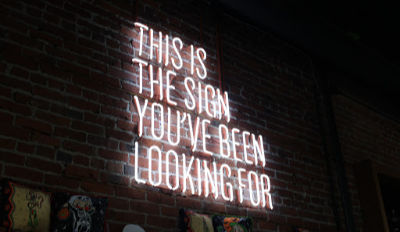Posts by Dr. Karen Finn
Looking For Signs You Should Get A Divorce?
If your marriage is like this…you may be looking at the end.
Coming face-to-face with the question “Should I get a divorce?” is one of the most sobering events of a person’s life. No matter how you answer the question, your answer will not only change your life, but the lives of your spouse and kids too. There’s just a lot to consider in trying to answer this question.
So it makes sense to search for some guidance on how to make this critical decision. This is one of those moments in life when it’s WISE to ask for help. (I sure did when I started thinking about divorce.)
Unless you or your kids are being abused by your spouse, your spouse has untreated addictions, or the example of marriage you’re providing for your children is horrible, the signs you should get a divorce are generally murky.
The truth is the signs you should get a divorce are often murky because what’s a deal breaker for one couple, is just a bump in the road for another.
If you’re asking yourself “should I get a divorce” chances are it’s more than a bump in the road. BUT, you have to look closely to find the truth.
The only way to know is to take a serious and sober look at you and your spouse individually and then at the marriage you’ve created together.
Remember, in any marriage there are 3 entities: you, your spouse and the life you’ve created together.
Let’s start with your spouse. How much do you believe they love you? Do you believe they would be willing to make the changes necessary to make your marriage better?
Most people are surprised by how willing their spouse is to make them happy – all it requires is that you ask for what you want. But crossing the chasm of your fears to actually ask for what you want can be really tough.
Often you have to push yourself to figure out what you want more: to stay in your safe zone and not risk asking for what you want OR get an answer to the question “should I get a divorce?”
If you want to know if you should get a divorce, you have to tackle these things:
- No one is a mind reader. One huge mistake people often make is they believe their spouse should somehow intuitively “know” how to love them. But the truth is that no one is a mind reader. Most people think they’re doing their best to show their spouse love and it comes as a shock when they hear it’s not working. Your spouse may get a bit defensive at first, but if your spouse really loves you, within reason he or she will likely do what it takes to get things back on track.
- It might be your delivery. You might not be asking for what you want in a way that your mate understands. For example, if you tell your spouse that you don’t feel like they love you anymore, BUT you don’t tell them what it would take for you to feel that love again… there’s no formula to get things back on track. In this event, you leave them guessing and consequently, they will use their best guess to figure out what you want.The problem is, people want to love in different ways and chances are, if you’re looking for signs that you should get a divorce, you will be right. Mistakenly right, but right nonetheless. Because we love differently, (a great book on this topic is Gary Chapman’s The 5 Love Languages: The Secret to Love that Lasts) and that is critical to finding and staying happy.
Let’s be real here, if you put the truth out there and you say what you need in a way that your spouse can hear AND you don’t get your needs met, that is the biggest sign that you should get a divorce. Unless you’re willing to negotiate what you want from your marriage, your spouse’s refusal to change is a definite sign you should get a divorce.
Now, let’s look at you. Are you living the life you want in your marriage AS the person you want to be in the world? Or, have you become someone else – someone you neither recognize nor like? If you feel like a piece of you is dying or has already died as a result of being in your marriage, if you’re keeping track of the signs that you should get a divorce, this is a powerful signal to consider closely.
Ideally, marriage allows each spouse to grow and change and experience the best of life. Spouses support and nurture each other. They bring out the best in each other more often than not.
When everything else has been considered, the true deal breakers and signs you should get a divorce are:
- Your marriage is suffocating – you literally cannon breathe inside of it and to stay would be to choose to snuff out the light inside of you. If that is happening, it’s time to pack and run. Get out of this cage and figure out what you have to do to salvage your own life.
- You can truly say in your heart that you have done everything you are willing to and can do, but your marriage isn’t getting better.
- Your spouse is unwilling or unable to make the specific changes you’ve requested (in language they understand)
However, if you’ve not explored what you can do to make your marriage better. You need to do that. If you’ve not done what you can to change things for the better, you owe it to yourself, your spouse and your kids to do that before making any decision about divorce. I believe that’s the only way that you’ll be able to look yourself in the eyes in years to come and know you’ve made the right decision today.
I’m Dr. Karen Finn, a divorce and personal life coach helping people just like you who are contemplating divorce. “Should you stay, or should you go?” is a powerful question and I’m here to help you make a smart decision that will lead to your greatest happiness… whether you stay OR go. You can join my newsletter list for free weekly advice. And, if you’re ready, you can take the first step toward working with me as your personal coach by scheduling a private consultation.
If you’re looking for more help answering the question “Should I stay or should I go?”, read more articles in Unhappy Marriage?.
Dealing With Divorce Loneliness? Hug Yourself Happy
Divorce loneliness can be overwhelming – but it doesn’t have to be crippling.
Your divorce will probably be one of the most intense emotional experiences you’ll ever face. It sure was for me. I had a full spectrum of extraordinarily strong emotions hit one after another in an often confusing and frightening way. Sound familiar?
The world of divorce can feel like a tornado has come through your life and wiped away all that was familiar and safe. I thought of it as being tied up, blind-folded, and stuffed into the front seat of a runaway roller coaster. I never knew when I was going to be slammed to the left or right by a sharp turn, and I dreaded any slow upward movement, because I knew that at some point, I would drop down into depths I couldn’t imagine, be thrown into a loop-de-loop, or even get caught up in a corkscrew.
I’ll be honest with you: There were times back then when I thought I might be going insane.
What I’ve found out since my divorce in 2002 is that the emotions of divorce are intense and change rapidly for most people. These emotions often include everything from denial, fear, hope, anger, loss, guilt, confusion, rejection, and loneliness.
I think the loneliness was the hardest for me, and that’s why I’ve developed some very specific strategies for dealing with the loneliness of divorce. Below are the top two strategies that work best with my clients. I’m hoping you’ll find them helpful too.
I know this is going to sound simple, but sometimes the best solutions are really not complicated. One of the easiest things to do to help yourself when you’re feeling the loneliness of divorce is to give yourself a hug. Yes, I do mean wrapping your arms around your chest and placing your hands just below your shoulder joints. Hold this hug for a bit, and after a while you’ll notice that you’re taking deeper breaths. You’ll want to continue to hug yourself at least until you sigh. We forget how transformative the power of touch truly is.
There’s something especially comforting about hugs. I used to think that the only good kinds of hugs were with others—either human or animal, but I’ve found that hugging body pillows, and especially hugging myself can have fabulously calming and comforting results, too.
The second of my top two strategies for dealing with loneliness after divorce is also simple to express: it’s acceptance.
The only way to get through the loneliness is to accept that it’s a natural part of the healing process of divorce. Your life is changing in a pretty dramatic way, and it’s okay to feel lonely when the spouse with whom you shared your isn’t a daily part of it anymore. Acceptance is one of those things that can usually be helped by talking with people who love you (like your friends and adult family members), people who are also dealing with divorce (like those in a divorce support group) or people who have successfully healed from divorce themselves, like a divorce therapist, a clergy member, or a divorce coach. I’m being very specific about the people who are typically great at helping people who are going through divorce, because I’ve seen the repercussions of the mistakes people make when they try to rely on people other than the ones I’ve listed.
Unfortunately, many people seek another romantic relationship to avoid feeling lonely. This can have tragic results. When you enter into another relationship before allowing yourself to heal completely and become a whole person again, you run the risk of getting into a relationship with someone who’s just like your ex—or someone who’s the exact opposite. Usually this doesn’t work out so well, and I can tell you from personal experience that breaking up with a new honey before you’ve healed from your divorce is especially devastating. (I felt like a double loser when it happened to me.)
Even more detrimental, people deal with the loneliness of their divorce by talking with their kids about it. They’ll tell the kids their fears under the guise of being honest, but the truth is they just need someone to talk to, and the kids are an easy audience. Kids aren’t cut out to be an adult friend to either one of their parents during divorce, and the long-term effects on both the kids and the parent-child relationship are just too costly. Believe me, it’s worth finding someone else to talk with.
Loneliness is a normal part of divorce recovery for most people, and your Functional Divorce Assignment has some specific things you can do right now to help you get through your loneliness quickly.
Your Functional Divorce Assignment:
Give yourself a hug right now. I’m serious. Go ahead and try it right now. I think you’ll be pleasantly surprised by how good it feels. Be sure and continue hugging yourself until you sigh—that’s how you’ll know you’re allowing yourself to relax and be comforted. (It’s OK if you start to cry on your way to sighing.)
Are you relying on the right person or people? Think about whom you’ve been relying on to support you through your loneliness and other emotional upheavals you’re experiencing. Based on the suggestions above, are you relying on the appropriate people? Do you need to look for another way to get the support you need?
I’m Dr. Karen Finn, a divorce and personal life coach helping people just like you who are dealing with the stress and pain of divorce. You can join my newsletter list for free weekly advice. And, if you’re ready, you can take the first step toward working with me as your personal coach by scheduling a private consultation.
This article originally appeared on YourTango.
Thank You, Pope Francis
Pope Francis’ statement is too late for me, but I’m OK with that now.
In August 2002, my divorce was final. When the judge signed the decree my immediate reaction was happiness. I thought I was free! I thought I would be happy (finally) because of a little ink on a piece of paper. Oh, the silly things I used to believe…
It didn’t take long before I started to feel suffocated by guilt. I was sure that God was going to punish me (by death) for getting divorced AND that I deserved it.
A bit irrational? Maybe. But, seriously, how many people make it through divorce without at least one irrational thought?
For this particular thought though, I had help in coming up with it. You see I was raised pseudo-Catholic.
My parents were both raised Catholic and went to parochial schools. However, outside of the baptisms for my younger siblings and attending funerals, I don’t remember us attending church as a family. Despite this, Catholic-ish teachings certainly made it into my psyche and one of those teachings was that if you got divorced, you committed a serious sin. So serious a sin that as a result you weren’t allowed to be a part of the church anymore.
But, it wasn’t only Catholic guilt that I felt after my divorce.
You see, shortly after meeting my first husband, I decided to embrace his religion and became a Southern Baptist. And guess what…. They didn’t look too kindly on divorce either.
My beliefs of this double-religious guilt produced tremendous fears and I was so stress out that I developed hives. To help me relax and hopefully shed some of my guilt, I decided to take a vacation. But instead of looking forward to the trip, I found myself actually dreading it because I figured this would be God’s chance to get me in a place crash. (Yeah, OK, I was pretty irrational by this point.)
As you probably guessed, God didn’t take me out with a plane crash or in any other deathly way because I got divorced. (Unless you consider me ditching the guilt-ridden woman persona a death.) What did happen as a result of my divorce was that I explored religions and my relationship with God.
I think that if back then I had had some reassurance that my divorce was OK in the eyes of God, that I wouldn’t have been so miserably distraught with guilt. So, from that standpoint I’m extremely grateful that Pope Francis made the statement:
“People who started a new union after the defeat of their sacramental marriage are not at all excommunicated, and they absolutely must not be treated that way. They always belong to the church.”
I sincerely hope that his message eases the pain that many divorced and divorcing Catholics feel.
However, if I had had his reassurances 13 years ago, I doubt that I would be the person I am today: confident in my place as one of God’s most loved children – just like everyone else.
I’m Dr. Karen Finn, a divorce and personal life coach helping people just like you who are dealing with the stress and pain of divorce. You can join my newsletter list for free weekly advice. And, if you’re ready, you can take the first step toward working with me as your personal coach by scheduling a private consultation.
This article originally appeared on YourTango.
The Only Real Shortcut To Healing From Divorce
All it takes is a bit of courage and determination.
There’s very little that’s easy about getting divorced. And just about all divorcees are on the lookout for shortcuts so they can move on with their life as quickly as possible and hopefully avoid some of the pain.
The problem is that when it comes to truly healing from your divorce you need to experience the pain so you can free yourself from it.
Yes, you read that correctly. You need to feel the pain so you can be free from it.
But feeling it doesn’t mean wallowing or drowning in it. It also doesn’t mean beating yourself up with thoughts of what you coulda, shoulda, or woulda done differently. It just means acknowledging the emotion and releasing it.
So how do you acknowledge an emotion and release it? Well, it kinda depends on the emotion.
If you’re feeling sad, you might acknowledge and release the sadness by crying or by getting busy and doing something productive. I find that when I’m sad crying helps until I can shift my thoughts toward being appreciative about what I’m sad about. Kinda the whole “every adversity … carries within it the seed of an equivalent or greater benefit” thing that Napoleon Hill is famous for saying.
Let me give you an example. A couple months ago my sweet cat Jewel died. I was very, very heartbroken about losing her and cried a lot. Yet it didn’t take me long to realize that my tears weren’t doing Jewel any good and they’d already done all they could for me. So I starting changing my thoughts to remembering all of the joy that Jewel brought into my life. Yes, those thoughts make me a little wistful, but remembering the joy helps me to look for more joy in my life now.
If you’re feeling angry, you can search for what’s under the anger. Usually anger is covering up fear. This is especially true when you’re healing from divorce. Divorce anger can be almost rageful and it usually covers some big fear of loss – loss of all the time you invested in a relationship that has failed, loss of love, loss of the dream of “happily ever after”, loss of being with your kids every day, loss of control of your life, and on and on and on…
If you can identify at least one of the fears that your anger is covering up, you can then shift your anger to addressing how to feel less fearful.
When I got divorced, although I was happy to have all three of our pets, I was also angry about all the responsibility and that my ex got to avoid dealing with the challenges of a geriatric dog. When I dug beneath the surface of my anger, I discovered that I was afraid I wouldn’t’ be able to take care of all my pets’ needs on my own. And that was a fear I could do something about. I hired a pet sitter to help care for my pets during the day while I was at work.
If you’re feeling lonely, you can embrace the alone-ness and get to know yourself a little bit better.
You might start off with a little crying and acknowledge the fear of being alone for the rest of your life. (Yes, that’s usually a big piece of why we feel lonely after divorce.) And then you can start remembering some of the things that you loved to do when you were a kid. (I know that probably sounds strange, but stick with me for a minute.)
Now, here’s the question you need to answer: How can you go out and do some of those things with a group?
My favorite way to find a group of people who like to do fun things is to visit www.meetup.com. You’ll find all kinds of groups that get together to do a whole bunch of different things from reading groups to adventure travel groups. Once you get out and join one of the outings, you’ll be absolutely AMAZED at all the fun you can have with a bunch of strangers doing something you love to do (yup, even if you’re an introvert like me).
Acknowledging and releasing your feelings isn’t an easy thing. It takes courage and determination. But by being courageous and determined now, you’ll be taking the only real shortcut there is to healing from divorce.
I’m Dr. Karen Finn, a divorce and personal life coach helping people just like you who are dealing with the stress and pain of divorce. You can join my newsletter list for free weekly advice. And, if you’re ready, you can take the first step toward working with me as your personal coach by scheduling a private consultation.
Unhappy Marriage? Here’s How to Make It Better (Part 1)
You have more power to change your marriage than you realize.
Living in an unhappy marriage can feel like you’re living in a trap. You’re stuck in a situation that you wish could be better, but deep down you’re afraid that this is as good as it gets.
Most of us marry with some expectation that we and our spouse will always be as attuned to each other as we are when we take our vows. But very few married couples continue dating, flirting and wanting to learn more about each other on a daily basis as they did before they said “I do”. And it’s perfectly understandable because the reality of married life (and parenthood) are WAY different than the realities of being single and in love.
So, how can you take your unhappy marriage and breathe some happiness into it?
The first step is to get real about what your idea of “happily ever after” is now. It will be different than it was when you got married because now you know what living with your spouse is like, what the daily challenges of running your family and home are, and what trying to live a fulfilling life as an individual within a marriage is like.
So, what does “happily ever after” look like for you today?
- Do you want to spend more quality time with your spouse?
- Do you want to have more sex?
- Do you want to feel respected and appreciated?
- Do you want more freedom to be you?
Just in case you’re feeling kinda stumped (like I was) about how to articulate what “happily ever after” is to you now, here’s an example:
- Our marriage is the model to which all other relationships aspire.
- We honor and respect each other to be uniquely ourselves.
- We have a shared faith in God.
- We honor our values and vows.
- We are united and support each other first before others.
- We enjoy the intimacy our marriage brings sexually, intellectually and spiritually.
- We are friends.
Once you have some clarity about what a happy marriage would look like to you, it can be really easy to fall into thinking “yeah, but”. Yeah, this new “happily ever after” is great, but s/he will never go for it. Yeah, this new “happily ever after” is great, but it’s just a pipe dream and could never be real.
All “yeah, but’s” ever get you are more of what you’ve already got. They disempower you and keep you stuck.
Instead of falling prey to the negative thoughts, ask yourself what one thing YOU can do today to make your marriage less unhappy and more like your ideal? (By this I mean that it’s something that’s totally within your control not something that you expect your spouse to do for you when you ask.)
Keep your one thing simple. Some examples are:
- Remember the first time you realized you loved your spouse.
- Be on the lookout for just one thing that is good about your marriage today.
- Think about the values that you and your spouse share and how those shared values make your life easier.
If you can do one simple thing each day to move your marriage toward your ideal, you’ll start shifting your perspective from everything that makes you unhappy and start noticing what is good about your marriage. And as you start noticing more of what’s good, you’ll probably be surprised by how much power you have over the happiness you can crate in your marriage.
But this won’t solve everything. Changing your perspective to one of hope and power is just the first step. Part 2 will share some ideas for creating a foundation for a better marriage based on your new “happily ever after”.
I’m Dr. Karen Finn, a divorce and personal life coach helping people just like you who are contemplating divorce. Should you stay, or should you go is a powerful question and I’m here to help you make a smart decision that will lead to your greatest happiness… whether you stay OR go. You can join my newsletter list for free weekly advice. And, if you’re ready, you can take the first step toward working with me as your personal coach by scheduling a private consultation.
If you’re looking for more help answering the question “Should I stay or should I go?”, read more articles in Unhappy Marriage?
Is It OK To Be Dating During Divorce?
My answer just might surprise you!
One of the loneliest times of your life is when you’re getting divorced. One moment you’re living with someone, having daily casual contact with someone you believe loves you.
And the next…you’re on your own.
Sure, the kids and the pets may still be living with you (at least occasionally), but that’s entirely different from sharing your life with a partner.
It can take a really long time to get your divorce legally finalized and the loneliness of being on your own can feel crippling. So it’s only natural to be curious about dating. (You’re probably also wondering if you’re still lovable and attractive too, but that’s a topic for another post.)
Unless the divorce laws where you live or the circumstances of your divorce would penalize you for dating before your divorce is finalized, casual dating before your divorce is final could be a great thing for you to do. That is IF you keep the following in mind:
- Dating has changed since the last time you were out there. I don’t know about you, but I sure didn’t find my first husband online. (Although that’s exactly how I found my current one.) Yet online dating is by far the most popular way for people leaving a marriage to find people to date.Online dating is a whole different world from meeting someone at school, at a bar or through friends. Once you finish agonizing over what to put in your profile, you’ll find that it’s very easy to get caught up in the winks, flirts, texts, calls and dating. Frankly, it can become a bit overwhelming and take LOTS of time.You’ll do best with online dating if you set limits for yourself on how much time you’ll spend doing it and if you keep following tips in mind.
- Be honest. You might be tempted to embellish the truth or even omit certain details (like the fact that you’re still legally married) about yourself when you start dating. But the best way to make sure that you protect yourself and that you’re respectful of others is to be truthful about your situation.You might find that being this honest will cause some people to not want to date you. That’s OK because you are who you are and if you’re having to pretend to get a date, that definitely won’t work for you or anyone else long-term.
- Keep it casual. Look at dating this soon after your marriage ends as a way to help you discover what you do and don’t like about potential partners AND what you do and don’t like about yourself when you’re with others. You might find that you’ve got some habits from your marriage that you want to ditch before you think about getting into a serious relationship. Honestly, that’s what this early phase of dating is all about – getting things clear in your mind so you can continue healing from your broken marriage.
- Your first job is to heal from your divorce. It’s incredibly easy to want to get into another relationship quickly after your marriage ends, but don’t until you’ve finished healing from your divorce.Your divorce is the death not only of your marriage but all your hopes and dreams for it too. As with any death, there is a period of grieving. You may have been grieving the losses before you (or your spouse) filed for divorce. That’s why no one can really tell you when’s the best time for you to start dating or to get into another relationship.Just keep in mind that grief has a way of popping up again even after you think you’re all done.
It’s really easy to believe that it’ll be simple to get back out there and start dating again if you keep these four tips in mind. But it can be more challenging than you think!
The challenge comes because you’re just coming out of a relationship. You’ve developed a comfort in or habit of being in a relationship. So it’s very, VERY easy to want to be in a relationship again quickly. While this does work for some people it doesn’t for everyone.
How do I know?
Because I got into a relationship before I was healed enough from my divorce to really be a good partner again. And let me tell you, the hurt and rejection I felt when that relationship ended was worse than when my marriage ended. The pain was so great because it brought up the unfinished healing from my divorce too.
So, is it OK to be dating during divorce? Yes, if you’re willing to accept the risks, it certainly can be a fun and wonderful part of your healing process.
I’m Dr. Karen Finn, a divorce coach and advisor helping people just like you who are dealing with the stress and pain of divorce. You can join my newsletter list for free weekly advice. If you’re ready to take the first step toward working with me as your personal coach, you can schedule an introductory private coaching session.
3 Definite Signs You Should Get A Divorce
Yes, there really are some circumstances that require you to get a divorce.
Very few marriages can be characterized as 100% “happily ever after”. Every marriage hits bumps in the road. Every marriage requires effort to make them work.
But sometimes no matter how much work you put in it just doesn’t seem like things get better. Or if they do get better, it’s only for a little while. And that’s what’s brought you to this point – to wondering if you should get a divorce.
And yet it’s so very difficult to know if divorce is the right answer for you. After all, you made a commitment when you got married. You’ve probably invested years in your marriage. And you might even have children together. But there are three situations that demand that you get a divorce:
- Abuse If you or your children are suffering physical, sexual, or emotional abuse from your spouse, you need to get a divorce. Absolutely. Positively. Period.
Signs You May Be In An Abusive Relationship
It’s Time To Acknowledge Male Victims Of Domestic Violence
How To Recognize Trauma In ChildrenAs much as you’d like to be understanding, forgiving and help your spouse, there’s nothing you can do. Your spouse needs to decide they want to stop being abusive and then get the help they need to change. It will be a long, hard road for them, but your safety and your children’s safety is most important. You must get out of the situation as quickly as possible.
(If you are the abuser, then you need to get the help you need immediately and stop putting your family at risk.)
- Untreated Addictions If your spouse has addictions that they refuse to get treatment for, you need to get a divorce.
Two months after one of my friends married, she found her husband in the bathroom sitting on the counter, making strange sounds and staring into his eyes in the mirror. She immediately called 911. At the hospital, she was told that he was abusing drugs.
Her response to the news was swift. She filed for divorce. She knew there was nothing she could do to make him stop abusing and that she didn’t want to live her life with a drug addict.
If your spouse refuses to seek treatment for their addictions, they are putting you and your children at risk. You need to do what’s best for you and your children’s safety. You need to get a divorce.
(If you have untreated addictions, then you need to get the help you need immediately and stop putting your family at risk.)
- Your Marriage Is A Horrible Example For Your Kids If you wouldn’t want your children to grow up to have the type of marriage you and your spouse have, then you need to get a divorce.
Yes, I’ll admit it. On the surface this sign that you should get a divorce might be a bit less clear than the other two, but it’s just as valid.
As a parent, it’s your job to make sure your children have the best chance of growing up to be healthy, happy, productive adults which includes knowing how to have a healthy relationship. If the example of marriage that you are showing to your kids EVERY DAY is terrible, then how is this helping you to give them the best chance of having a good marriage or even a good relationship? The answer: It’s NOT.
Let me be especially clear on this: If you are working on your marriage to make it better or if you just have periods when things in your marriage are bad, then that’s different from having a bad relationship EVERY DAY that you’re just living with. It’s only those marriages that are bad EVERY DAY that must end for the sake of the children.
Even if you’re in one of these situations and know you should get a divorce, it can be really hard to decide to leave. That’s because this – the way you’re living your life right now – is what normal is to you. It may not have been this way in the beginning, but that’s how it is now. (If it wasn’t normal to you, you’d already be gone.)
But I’m here to tell you that you don’t have to continue to live like this. Your life can definitely be better.
Sometimes it just takes a little extra support. Luckily, there are various support organizations you can call on for help.
If you or your children are victims of abuse and you live in the US check out www.thehotline.org. If you’re in the UK and need help with abuse, check out www.nationaldomesticviolencehelpline.org.uk.
If your spouse has untreated addictions, www.nar-anon.com (for drug abuse) and www.al-anon.org (for alcohol abuse) are both organizations that can help.
You can get additional support in navigating the confusion of divorce by working with a divorce coach. If you’d like to see if working with me is right for you, schedule your 30-minute consultation at www.timetrade.com/book/2N7QJ.
Deciding to divorce is never easy, but if one of these signs you should get a divorce describes your situation, you now know that divorce is absolutely your best choice.
Even when you know it’s the right decision, getting a divorce is pretty frightening. I’m Dr. Karen Finn, a divorce and personal life coach helping people just like you who are contemplating divorce. And I can help you too. You can join my newsletter list for free weekly advice. And, if you’re ready, you can take the first step toward working with me as your personal coach by scheduling a private consultation.
If you’re looking for more help answering the question “Should I stay or should I go?”, read more articles in Unhappy Marriage?
3 Annoying People To Ignore While You’re Getting Divorced
Sometimes those closest to you can be the most annoying when you’re getting divorced.
Divorce is hard. There’s absolutely nothing easy about turning your life upside down and inside out.
Divorce is something most couples stumble into unexpectedly. You just can’t prepare yourself for something like that, so when it happens just about everything feels unfamiliar and phony.
Of course you’ll ask for help, guidance, or just a strong shoulder to lean on when the going gets tough. But, believe it or not, the very people you’re likely to rely on may end up making your divorce even harder than necessary (or, at least, more annoying). So, what’s a great tip for getting through divorce well?
Spend less of your precious time and energy listening to people you’re better off ignoring.
You need to focus on making a new “normal” for yourself and your kids, healing from your divorce, and moving on with your life. All things you just can’t do if the people in your life bring you down.
Who are these people you’d do better to ignore? Surprisingly, they’re the exact people you usually turn to first:
1. Your ex
Most likely the things your ex is saying sounds like nagging or them trying to control you (“Haven’t you talked with your attorney yet?” or “If you don’t put the house on the market next week, I won’t let you have the extra day with the kids you asked for.”) They might even sound whiny or critical and judgmental.
Look, I know you’ve spent your entire marriage caring about what this person thinks, feeling obligated to please them, but that’s not your job anymore. It’s time to start setting new boundaries around what you will and will not accept from them and then do your part to make sure your new boundaries stick.
It’s also time for you to start changing your expectations for your ex. They aren’t the same person you married. They’re trying to create their own new normal, heal from their divorce, and move on with their life, too. (Or, maybe that’s too optimistic and they’re just trying to function on a day-to-day basis). The bottom-line is, though it’s painful, your ex is more focused on their own life than on you. You just can’t expect much from them. And, changing your expectations is probably the single most important thing you can do to prevent them from remaining an annoying splinter in your life.
2. Your friends and family
I know! It’s hard to believe I would suggest ignoring the people you thought you could count on for sure. But I am, if they’re second guessing your decisions, complaining about how your divorce is affecting them, feeding negativity, or making things even more difficult with your ex. None of that is helping you right now.
It’s time to start tuning these people out as sources of comfort or guidance. Realizing that people you’ve relied on for most of your life are more interested in how your divorce and decisions are impacting them, instead of being there for you, often feels like another betrayal. However, the truth is that everyone cares about themselves and how things affect them. Some people just can’t put the needs of others first. Unfortunately, this is just another of the hurtful realizations of divorce. Your relationships with friends and family may change during this time of transition. Hold on to the folks who lift you up and help you grow, but create better boundaries with anyone who tears you down or makes your struggle more difficult.
3. You
Yep, you might need to start ignoring some of the stuff you’re saying, thinking, and doing too.
If you’re feeling victimized by your divorce, you can’t let that feeling consume you. Parts of divorce feel really hard and super scary, while others just piss you off … but focusing on the fear, anger, and “injustice of it all” without taking positive action to change your situation is just really annoying!
Or, perhaps you’re beating yourself up with a bunch of shoulda, coulda, wouldas. If you’re being hard on yourself, I hope you feel irritated with that part of you! Beating yourself up when you’re already down is NEVER going to make things better. Realize that you’re doing the best you can in every situation. Being gentle with yourself moves you much further along toward creating a new, healthy normal in your life.
I know, setting new boundaries isn’t easy during times of change and strife. But this is what divorce requires. To really heal from your divorce and move on (without dragging unresolved baggage along with you), you must start tuning out toxic voices that hinder your clarity … even if those toxic voices come from loved ones, or your own self.
So the next time you start feeling annoyed with others during your divorce, take a deep breath. Changing your relationships with these folks won’t happen overnight. But, it is totally worth doing because you’re the only person who can live your new life and you’re the only one that has to live with the consequences of your decisions.
I’m Dr. Karen Finn, a divorce coach and advisor helping people just like you who are dealing with the stress and pain of divorce. You can join my newsletter list for free weekly advice. If you’re ready to take the first step toward working with me as your personal coach, you can schedule an introductory private coaching session.
This article was originally published at YourTango.
How To Tell Your Kids You’re Getting Divorced
Planning and compassion are the most important pieces of this life-altering conversation.
One of the most difficult things to do after you’ve decided to divorce is telling your children about your decision. It’s so hard because you aren’t sure exactly how your kids will react and you’re concerned that your divorce will negatively impact them for the rest of their lives. Those are some really important and valid things to worry about – especially since you’ve probably got the same concerns for yourself. That’s why it’s so important to get this conversation right.
To get it right, you must keep the big picture goals in mind: happiness for both parents who raise happy, healthy children who have the support and love they need to become happy, healthy, contributing adults. From this starting point, you can begin planning how you will tell your kids.
As difficult as it is, the best way to prepare is together. It’s best for your kids if you and your soon-to-be-ex spouse have the exact same message.
What do you need to include in your preparation?
First, are you 100% sure that the separation and/or divorce is happening? If it’s in question, you’re not ready to tell the kids because you’ll just cause them unnecessary stress and worry. If you’re sure, then you need to plan on taking about an hour for this conversation. Schedule it for at least 48 hours before and no more than 2 weeks before one of you move out.
You must agree on the message. Some of the key statements that you need to make are:
- This is an adult decision
- You both will always love them
- You both will always be their parents
- What specific things will remain the same in the kids’ lives (e.g., bedtime, time with their friends, school, extracurricular activities, etc.)
- What specific things will change in their lives (when they will see Mom and/or Dad, when one of their parents is moving out, they’ll have 2 homes now, etc.)
You must also avoid saying anything about either of you not loving the other anymore. If you do say you don’t love each other anymore, your kids will just wonder and worry about whether or not either of you might decide to stop loving them too.
How you deliver the message is something else you need to agree on. Some things to keep in mind about how you plan to tell the kids are:
- Tell them together.
- Think like your kids keeping in mind their level of understanding and potential need for emotional support.
- Agreeing not blame or have any conflict as you tell the children.
- Agreeing to remain as calm as possible.
As part of your planning, you’ll want to figure out when you’ll talk with your children. Keep in mind that you’ll want to choose a time when you won’t be rushed and they will have plenty of opportunity to ask questions and process what you’re going to tell them.
After putting in the effort to plan and prepare, it is easier to tell you children about your divorce. But you never really can predict exactly how things will go. So, here are some points to keep in mind when you do sit your family down for this conversation:
- Let all your kids hear the news at the same time. Then allow every child alone time with each of you. Sharing the news as a family emphasizes the fact that you’re still a family who can handle things together. The individual time will allow each child to know that they’re still loved by both their parents.
- Reassure your children together and individually that they’ll still be loved and cared for.
- Be ready to answer all of their questions honestly without going into all the gory details – remember this is an adult decision.
- Be as calm as possible, but if you start to cry or choke up that’s OK. This is sad for everyone. Besides, you being sad will give your kids permission to feel their emotions too which will give you the opportunity to let them know that what they’re feeling is normal.
- Let the kids know that they can still love both of you just like you both love them.
- Do NOT say you don’t love each other anymore. I know I’ve already said this, but it’s too important to miss.
- Spare your kids the legal and financial details.
- You might want to talk about other kids they know with divorced parents if it will help them understand the situation and not feel so alone or different from their friends with married parents.
Just because you’ve told your kids and you’ve answered all of their questions, your job isn’t done. As each child processes how their life is changing they’ll continue to have questions (maybe even the same ones you’ve already answered). They’ll also need ongoing reassurance that you both still love them. So, continue to shower them with love and understanding.
However, love and understanding doesn’t mean that their routines go out the window. One of the things that will help them the most is to keep some things about their lives as consistent as possible. And if your kids are older you’ll also want to keep your expectations of them as consistent as possible too.
Obviously the only way you’re going to keep as positive as possible and help your kids through this big transition for your family is to take care of yourself. Get the support you need and deserve so you can keep the big picture goals in mind: 2 happy parents who raise happy, healthy children who have the support and love they need to become happy, healthy, contributing adults.
I’m Dr. Karen Finn, a divorce coach and advisor helping people just like you who are dealing with the stress and pain of divorce. You can join my newsletter list for free weekly advice. If you’re interested in taking the first step toward working with me, you can schedule an introductory private coaching session.
If you’re looking for more help on how to deal with the challenges you’re facing now, read more about Life After Divorce.
Gray Divorce’s Unexpected Challenge? Your Adult Kids
You’d like to believe that your adult children will be able to take your divorce in stride…
Divorcing when you’re 50 or older has a unique set of challenges (including the label “gray divorce”). You face more complicated financial concerns because retirement is that much closer (CNBC). Health insurance and health care are more important to get right than it was in your 20’s. You may also wind up paying spousal support for the rest of your life (Covy).
You’ve probably already considered or dealt with these issues of retirement, health care/insurance, and alimony when it comes to your over-50 divorce. But the one surprising issue you may get to deal with is the reaction your adults kids are having to your divorce.
There’s probably a part of you that believed your kids would behave and react as the adults they are instead of the children they were, but divorce is hard on kids no matter what their age. They never want the dream of their parents staying together swept away.
But the challenges for adult kids of divorce (AKODs) are a bit different from those for younger kids simply because they are adults and the relationship you and your ex have with them.
Here are 5 of the most common ways that AKODs have difficulty with their parents’ divorce:
- They question their identity and feel bewildered, lost and maybe even betrayed. Believe it or not, our families play a large part in who we see ourselves as and how we interact with the world. We even tend model the behavior of our parents in our relationships.But when their parents’ divorce, AKODs question what was real about their family. Was any of it true? Did their parents just stay together for their sake? Should they take sides? How can they deal with all of this when they’ve got their own family to raise? And a million others…
- They know too many details about why you’re getting divorced. Unlike younger children, AKODs usually get to hear all the details about their parents’ divorce. They don’t want to hear it! They don’t know what to do with the information because the truth is they love both of you. They don’t want to take sides. They feel torn. They’re stuck agreeing with dad when he complains about mom and agreeing with mom when she complains about dad because they love both of you and want you both to feel better (or maybe just get back together).
- They might feel compelled to play parent, mediator or friend to both of you.This is where you can help your adult kids a lot: DON’T expect them to provide guidance as you go through your divorce. Just like younger kids, your adult kids will want to help make you feel better, but it’s not their job. Find a therapist or coach to guide you instead of your kids.
- They might need to work with a therapist to work through their feelings about your divorce. Your adult kids have their own lives and worries without taking on yours as well. You and your ex may have been their primary source of support, but now neither of you are up to the task because of your own struggles. It’s a great idea for them to reach out to a neutral person to work through their feelings about your divorce.
- They need to grieve the loss of their family as they knew it. The death of your marriage is the death of their family. Your divorce shatters their dreams of having their parents and family live happily ever after.Your kids need to mourn their losses. They’ll grieve and probably won’t be quite themselves as they work through their grief. They might be more tense or curt. They might not want to talk with you as much as you’d like. But once they work through their grief (just like you have to work through yours), they’ll be back to themselves too.
As many differences as there are with gray divorce, there’s one thing that’s constant no matter when you get divorced: your divorce will impact your children. Your job as a parent is to understand that your adult kids will need to have your support as they come to terms with your divorce because a parent’s job is never really done.
I’m Dr. Karen Finn, a divorce coach and advisor helping people just like you who are dealing with the stress and pain of divorce. You can join my newsletter list for free weekly advice. If you’re interested in taking the first step toward working with me, you can schedule an introductory private coaching session.










